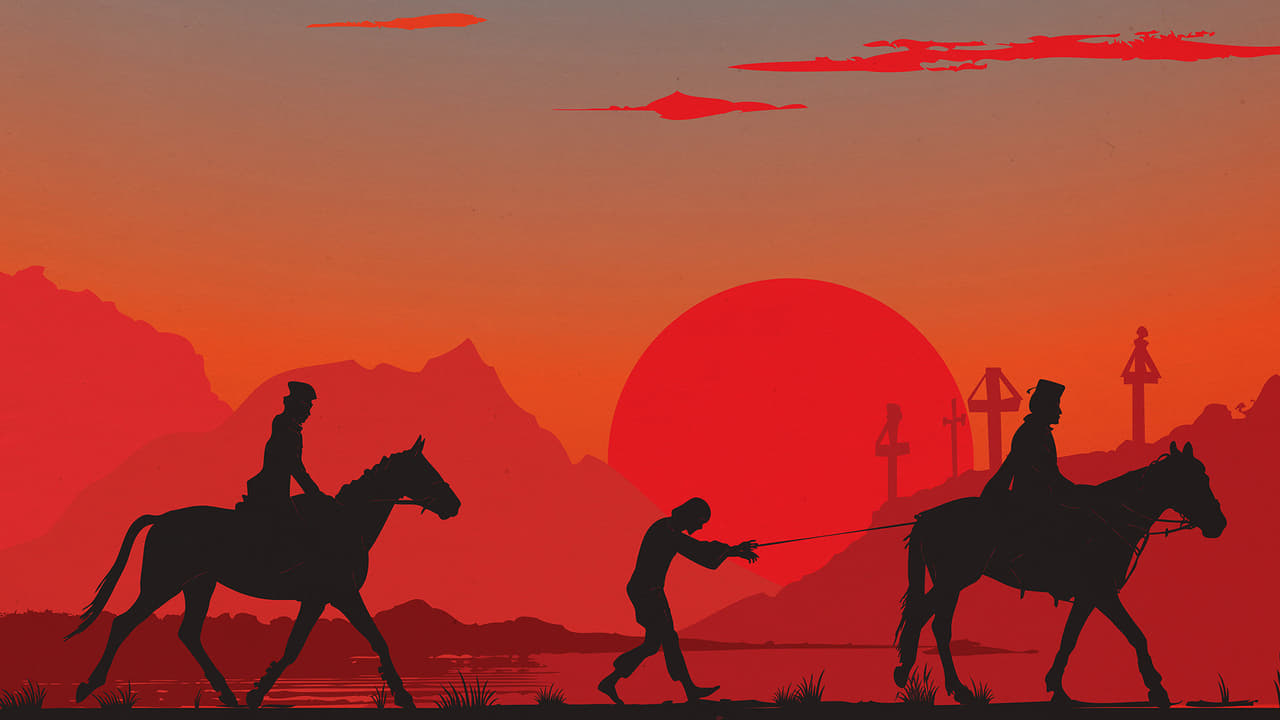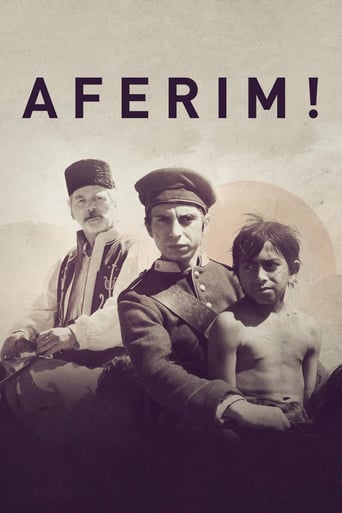

The performances transcend the film's tropes, grounding it in characters that feel more complete than this subgenre often produces.
... View MoreThis movie was so-so. It had it's moments, but wasn't the greatest.
... View MoreIf you're interested in the topic at hand, you should just watch it and judge yourself because the reviews have gone very biased by people that didn't even watch it and just hate (or love) the creator. I liked it, it was well written, narrated, and directed and it was about a topic that interests me.
... View MoreThe story, direction, characters, and writing/dialogue is akin to taking a tranquilizer shot to the neck, but everything else was so well done.
... View MoreSet in 1835 Wallachia (now southern Romania), approximately half-way in time between Miguel de Cervantes' masterpiece and present day, the film follows Constandin, a bounty hunter, and his son Ionita, as they chase a runaway gypsy slave. And yes, there is a Dulcinea del Toboso, maybe less adored and more punched in the face, and yes, they do stop at the inn, and yes, the combination of Romanian proverbs and down to earth conversations is reminiscent of the Don Quixote-Sancho Panza exchanges. The father and son journey is recreated from historical, literary and musical sources by the Director Radu Jude with creativity, intelligence and obvious sympathy for that part of the world. Beautifully shot from a necessary distance by Marius Panduru in black and white, the movie smoothly fades in and out of images, thoughts, prejudices and superstitions characteristic of a society marked by poverty, corruption, racism, xenophobia, misogyny, and religious intolerance. Things of the past, one might say, things of the past. Teodor Corban gives Constandin determination, humor and a certain kindness, mainly directed toward Ionita (a well-cast Mihai Comanoiu) and rarely toward the gypsy slave Carfin (Toma Cuzin, in a convincing role). Mihale Sirbu and her tormented character Sultana skillfully navigate the dangerous waters of passion and fear, especially in the menacing presence of boyar Iordache (Alexandru Dabija). In a deceptively easy role, Alexandru Bindea portrays a Priest who summarizes the mentalities of the time.So, is "Aferim!" a masterpiece? Unfortunately, although it comes so close, is not. Shot in only 23 days (according to an interview given by Radu Jude) the movie appears to be assembled in a hurry. The verbal and physical violence is overwhelming. After seeing the movie, go home and hide all scissors! Radu Jude decided that cruelty is the legacy of that era and should also be the mark of his movie. He placed the most violent scene at the very end to shock the audiences and festival juries, with vastly different results. Should that scene had been placed earlier, the mark of the movie could have been the donquixotesque father and son horseback trip across Wallachia in search of the meaning of life. Too bad that instead of a masterpiece we got a master and a piece.
... View MoreIt is 1835. Constandin and his son are searching for a runaway slave, to be returned to his owner for a reward. Constandin is the local constable and during the journey he is trying to teach his naive, uninterested son what his job entails. Constandin is the protagonist of the piece, and the story is told through his eyes and he is in nearly every scene. His character is the most developed and I felt the son and the slave's personae could have used some padding out. I have never been to Romania and know little of its history. We find that prejudice and racism are endemic in the country at this time, as well as abject poverty and blind ignorance. The screenplay is shot through with these traits and in many ways mirrors the U.S. around the same period. The slave in question is a Gypsy, who apparently were a despised minority and subject to the same indignity and humiliation as minorities in our country were. If we are to believe the screenplay, there was a distinct lack of national moral character and ethical bankruptcy rife in Romania at this time. Constandin, who is the most upright individual we encounter in the film, trying to make a man of his young son, stuns us and hires a whore for him at an overnight stop. He congratulates his son afterwards and continues to impart some of his unique wisdom and worldliness as they continue their travels. Earlier, they come across an Orthodox priest who delivers a comical rant containing all the bigotry and prejudice he can muster, omitting no ethnic group. Do such deeply-held sentiments and moral lapses continue in present-day Romania? The film was shot in black-and-white, although the poster on the website is in color, and is billed as a comedy/western/drama. The latter categories fit better, as there is very little humor to be found. I appreciated the photography which as a reviewer mentioned gives it an authentic look. But "Aferim!" is a bleak and depressing film and ends on a very downbeat note. As such, it does not fall under my definition of entertainment, and I can only recommend it on the basis of its technical accomplishments.
... View MoreSome displays of racism can be so lurid and outlandish that they actually short-circuit the usual feelings of outrage one ought to have when witnessing such things. (The 1975 film Mandingo immediately comes to mind.) It's not hard to believe people thought and felt this way back in the day, but it's hard to relate to them as actual human beings and not just demented caricatures of humanity's ugly collective past. Thus, it's much harder to actually feel anger towards them.Aferim! does a fine job of offering you both sides of the coin - the absurdity and the outrage - in one masterful cinematic package. The modern viewer can observe a place as alien as 19th century Wallachia with clinical detachment, smirking as these ignorant bumpkins - a slave-catcher and his teenage son (along with a priest who briefly tags along) - ride across the bucolic countryside and discuss gypsies (and Jews) in the most over-the-top, Borat-esque way imaginable. But the sentiments expressed and their social consequences are of course very real (in fact, some of the dialogue was taken from "historical record"). After the runaway is captured and his interactions with the father-son duo imbue all three with relate-able human qualities, the underlying dynamic of the film is driven home in the brutal, visceral finale - and the floodgates of outrage and sadness are bludgeoned open, leaving the weight of all you've just witnessed to simmer in your soul for days to come.
... View MoreWhy the hell is this film in black n white? I don't have any issue with greyscale photography but from the looks of it, Aferim! appears as if a colourless filter was applied to it without any consideration of how to make it look better for the little enhancements that could've turned its images more expressive & attractive are sorely missing.Set in Wallachia in the early 19th century, the story of Aferim! concerns a local policeman & his son who are hired by an Iordache to track down & retrieve one of his slaves who had run away from his estate after having an affair with his wife. The plot follows the journey of this father & son duo during which the former tries to impart some wisdom to the latter.Co-written & directed by Radu Jude, Aferim! addresses the Roma slavery and covers all the absurdities of religion & caste system that only discriminates one from another. Although its subject matter is harsh & affecting, the fine use of wit in conversations between the father & son keep the experience lighthearted for the most part but its final act turns out to be more disturbing than expected.It's quite evident from the background that the locations are beautiful to look at but it would have looked far more appealing if the entire movie was filmed in colour for its black-n-white camera-work only ends up seeping the life out of those images, thus rendering it colourless both literally & figuratively. Performances are quite good, Editing however is lethargic & it's a pain to sit through if the conversations don't work out for you.On an overall scale, Aferim! is driven by its heavily-worded screenplay, brilliant contribution from its leading duo, and its discomforting depiction of a shameful era in Romanian history. Dressed as a western, the film will manage to keep the viewers' interest alive solely on how they react to the father-son conversation which virtually goes on from start to finish. A very strange mix of brutality & hilarity, Aferim! was good for me only during the final 15 minutes.
... View More